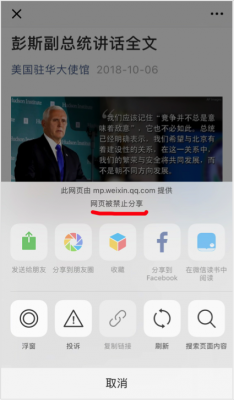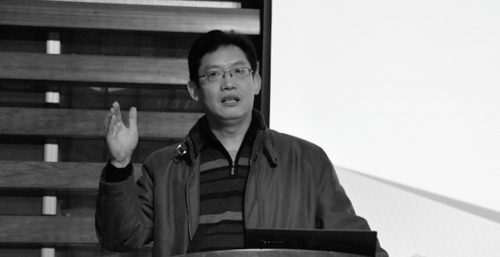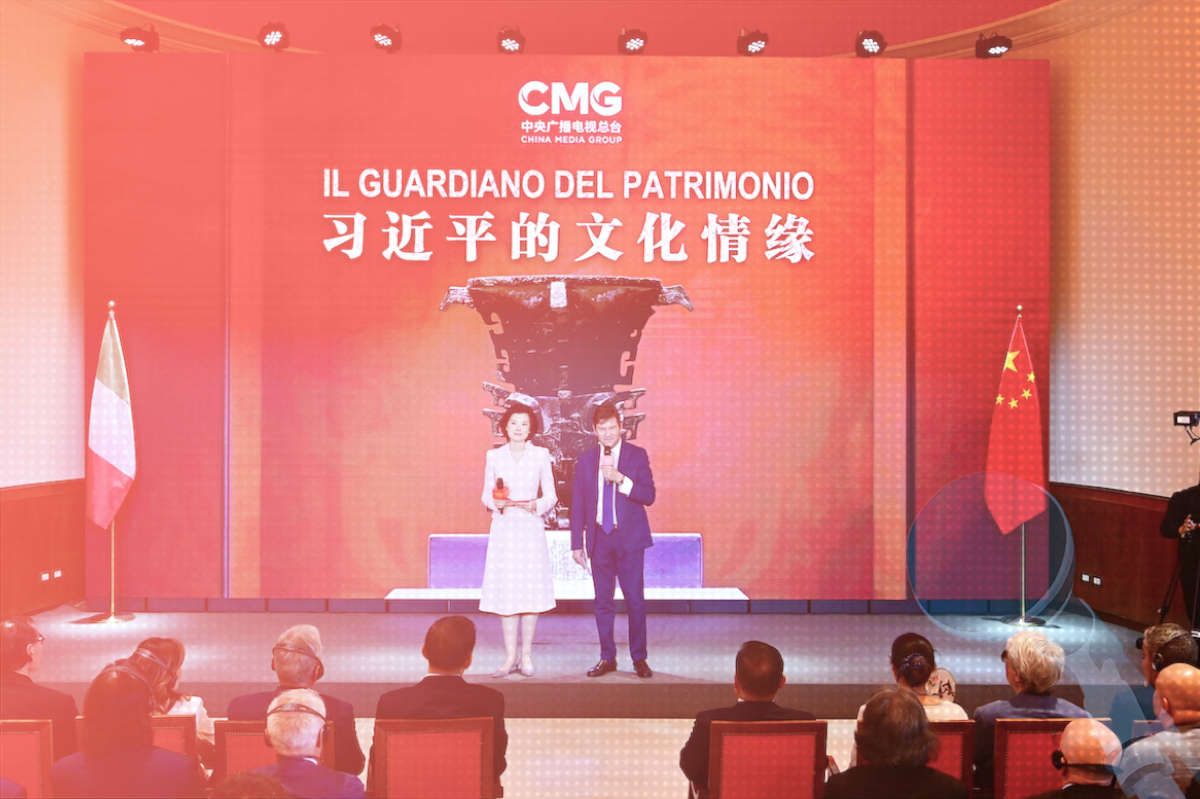Headlines and Hashtags
Professor punished for praise of public intellectuals
This week in China’s media, the authorities seemed not to know quite what to do about a speech by US Vice President Mike Pence sharply criticizing China and accusing it of election meddling. A full-text version of the speech in Chinese was not deleted from the official WeChat account of the US Embassy in China. But authorities still moved to curtail sharing of the post. Meanwhile, the same material on Weibo seemed to still be shareable up through this weekend.
We also had news this week that a professor from Communication University of Zhejiang was disciplined by university officials for apparently putting a positive spin on the notion of the “public intellectual,” or gonggong zhishifengzi (公共知识分子), which has been a highly sensitive notion for the Chinese Communist Party in the past decade — but particularly so under Xi Jinping. The professor’s public speech, delivered during a welcome ceremony for incoming students, was reportedly called, “Public Intellectuals Are a Scarce Resource.” Well, he’s not wrong about that.
THIS WEEK IN CHINA’S MEDIA
October 6-12, 2018
➢ China speech by US Vice-President Pence enters Chinese social media, handled cautiously on WeChat
➢ TV host Cui Yongyuan again accuses police of negligence, and alleges that Shanghai police accepted bribes in pursuit of Fan Bingbing case
➢ Professor accused of inappropriate speech on “public intellectuals” at welcome ceremony for incoming students
➢ Prime-time program on China Central Television introduces the special vocabulary of Xi Jinping
➢ Weibo experiments with “full-site blocking of blacklisted individual accounts” (一人拉黑,全站禁评)
[1] China speech by US Vice-President Pence enters Chinese social media, handled cautiously on WeChat
On October 6, 2018, the U.S. Embassy in China used its WeChat public account to share a Chinese-language version of the October 4 speech on China by Vice President Mike Pence. While the authorities were unhappy with the substance of Pence’s remarks, which dealt with the steps China is allegedly taking to undermine the Trump administration ahead of mid-term elections, they did not move to delete the U.S. Embassy post. However, sharing and saving of the post as well as copying of its link were all disabled on the WeChat platform.

By contrast, sharing and commentary on content about the Pence speech shared by “@USEmbassyinChina” (@美国驻华大使馆) on Weibo was still possible.
Key Chinese Sources:
WeChat public account “US Embassy in China” (美国驻华大使馆): 彭斯副总统讲话全文
Weibo “@USEmbassyinChina” (@美国驻华大使馆): 彭斯副总统讲话全文
[2] TV host Cui Yongyuan again accuses police of negligence, and alleges that Shanghai police accepted bribes in pursuit of Fan Bingbing case
On October 7 and 10, celebrity television host Cui Yongyuan (崔永元) made two Weibo posts — “One sigh and one roll of thunder” (一声长叹一声雷) and “Informing on the police” (举报公安) — in which he accused police in Shanghai of corruption, saying that, “Once, right in my face they drank wine that was 20,000 yuan a bottle, and smoked cigarettes that were 1,000 yuan apiece, and took away hundreds of thousands of yuan in a bag.” In the posts, he also alleged that Beijing police had done nothing in the face of Cui’s reports that he was receiving threats. By the weekend, Cui’s first post had received more than 12 million reads and 9,367 likes.
Facing public opinion pressure, Shanghai police issued a notice on October 10 saying that the accusations made in Cui’s post pointed to possible illegal conduct by their officers, a matter they viewed with seriousness. But they also said they had tried on numerous occasions to contact Cui about these accusations but had been unable to reach him — and they hoped Cui could cooperate with their investigation. Cui retorted that the suggested that he was unreachable was nonsense. And he again accused one officer, Peng Fen (彭奋), the former deputy head of the economic crimes division in Shanghai’s Changning District, of corruption.
Through its official WeChat account, the Legal Daily (法制日报) wrote commented on Cui’s “One sigh and one roll of thunder” post by saying that the case, now exposed, must be investigated thoroughly.
Key Chinese Sources:
Cui Yongyuan’s Weibo account (@小崔读书汇): 一声长叹一声雷
Cui Yongyuan’s Weibo account (@小崔读书汇): 举报公安
Official Weibo account of Shanghai PSB (@警民直通车-上海
警情通报)
WeChat public account “Legal Daily” (法制日报): 法制日报评《一声长叹一声雷》:有人捅破这层纸,就该深查下去!
21st Century Business Herald (21世纪经济报道): “快鹿系”集资诈骗案上海庭审: 投资人实际经济损失逾百亿
China Times (华夏时报): “快鹿系”集资诈骗案开审:集资规模超400亿未兑付逾百亿
[3] Professor accused of inappropriate speech on “public intellectuals” at welcome ceremony for incoming students
On October 12, The Paper learned from a source at the Communication University of Zhejiang that the deputy director of the university’s Academy of Literature, Zhao Siyun (赵思运), had been disciplined by the university with the issue of an “serious warning of internal Party discipline” (党内严重警告处分).

On September 30, the Communication University of Zhejiang had held its welcome ceremony for the 2018 entrance class, for which Professor Zhao Siyun had delivered a speech called “Public Intellectuals Are a Scarce Resource” (公共知识分子是一种稀缺资源). The speech treated the notion of the “public intellectual,” a term that now bears deep political stigma in China, as something positive. Not long after the speech, the university issued a formal document deciding that a “serious warning of internal Party discipline” would be issued in the matter.
The university document shows that Zhao Siyun has been accused of “the existence of problems in violation of political discipline” (存在违反政治纪律的问题). According to the document, on September 30, 2018, Zhao Siyun was serving in an interim role in charge of administrative matters at the school, and in his speech for the 2018 welcome ceremony he made “certain inappropriate remarks” (其中有个别不当用语). The university noted in the document, moreover, that Zhao had made certain “erroneous expressions” (发表错误言论) in the 2013-2015 period that had had “definite negative influence” (一定负面影响).
Key Chinese Sources:
QQ Daily Brief (天天快报): 浙传教授赵思运被校方处分,新生开学典礼致辞有个别不当用语
The Paper (澎湃新闻): 开学典礼致辞有不当用语 浙传一教授被处分
Bai Jia Hao “Shi Feike” (百家号”石扉客”): 观察 | 终于有人站出来为公知正名了
[4] Prime-time program on China Central Television introduces the special vocabulary of Xi Jinping
The “Lecture Room” (百家讲坛) program on China Central Television, the country’s state broadcaster, is now running a special series of episodes called “Bringing the Language of ‘Ping’ Closer to the People: The Dictionary of General Secretary Xi Jinping (平”语”近人——习近平总书记用典). From October 8 through October 19, the program will run at 8PM each night.
The program, created jointly by the Central Propaganda Department and China Media Group, the state-run conglomerate created in March 2018 by combining CCTV and China National Radio, draws on the phrases and concepts in Xi Jinping’s speeches to promote his so-called “banner term” (旗帜语), “Xi Jinping Thought of Socialism With Chinese Characteristics for a New Era” (习近平新时代中国特色社会主义思想). The program series will have 12 episodes in all.

According to one report in Guangming Daily, the series has created a stir — and of course they mean that in a good way — among intellectuals in China: “The broad masses of intellectuals have brushed up [their knowledge of Xi Jinping’s] important speeches, again reading his classic writings, and felt deeply heartened by Xi Jinping Thought of Socialism With Chinese Characteristics for a New Era . . . “
Between September 30 and October 4 this year, another propaganda program on the study of Xi Jinping’s ideas aired on Hunan Satellite TV, Hunan Education TV and People’s Daily Online. This program, “The Tide of Socialism” (社会主义有点潮), was created by the Hunan Provincial Propaganda Department (湖南省委宣传部) and the Hunan Broadcasting System (湖南广播电视台).
Key Chinese Sources:
CCTV Online (中央电视台网站): “百家讲坛”特别节目《平”语”近人》播出
Guangming Daily (光明日报): 人民情怀 理政智慧 文化自信 《平”语”近人——习近平总书记用典》引起知识界热烈反响
Xinhua Online (新华网): 《平”语”近人——习近平总书记用典》引发社会共鸣
People’s Daily Online (人民网): 推动习近平新时代中国特色社会主义思想“天天见”“天天新”“天天深”大型理论节目 《社会主义有点潮》第二季《新时代学习大会》今日开播
AND: 大型理论节目《新时代学习大会》开播
[5] Weibo experiments with “full-site blocking of blacklisted individual accounts” (一人拉黑,全站禁评)
On September 26, content managers at Weibo issued a notice about a trial system called “comment bans for blacklisting” (博主拉黑禁评), to be tested on September 27, in which account holders who had comments deleted and were blacklisted (拉黑) by other users (博主) would be prevented from all comment functions throughout the Weibo platform for 3 days. This effectively meant that if a user made a comment that resulted in blacklisting by another user with a moderating role on one portion of the Weibo platform (including on the moderator’s own Weibo posts), the user making the comment would be prevented from commenting anywhere else on the platform. The trial was to first be introduced for Weibo users with more than 100,000 fans, and the same services later offered to all verified users (认证用户) and Weibo members (微博会员) on the Weibo platform.
Some remarking on the new trial system argued that it disregarded one of the key steps in the blacklisting process — the mechanism of appeals (申诉机制). The system could mean, they said, that “Big V” users on Weibo, those with large followings, would be able to exercise censorship of others without any oversight or consequences, and ordinary users would pay the price.
Key Chinese Sources:
The Paper (澎湃新闻网): 新浪微博测试新功能:账号被博主删评并拉黑,将全站禁评3天
WeChat public account “Media Observer” (微信公众号”传媒大观察”): 微博推出的“博主拉黑禁止评论”,这些年真是为评论区操碎了心
Zhihua (知乎): 如何看待新浪微博在 9 月 27 日上线的「博主拉黑全站禁评」功能?





















